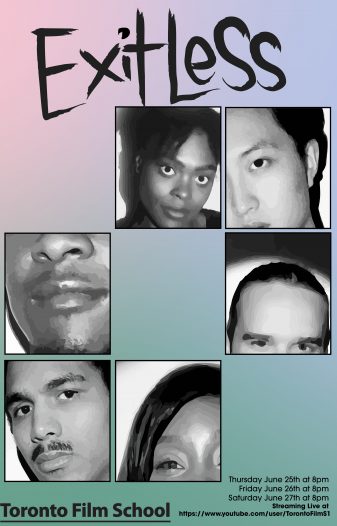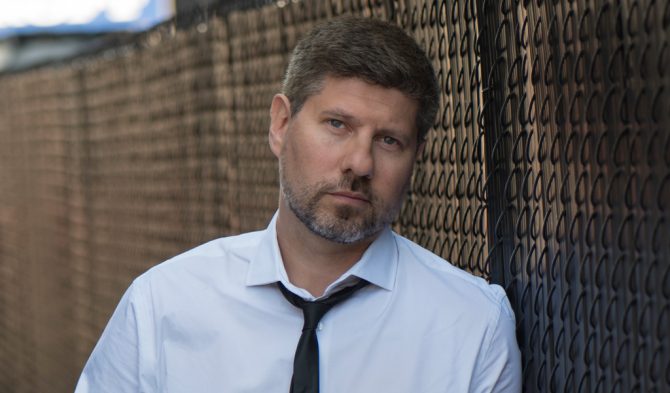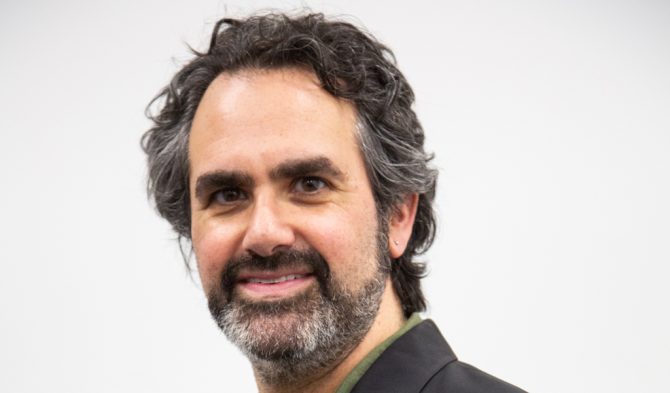Toronto Film School’s Acting Students Bring ‘Exit-Less’ to the Virtual Stage
Much like the characters they’re about to bring to life on the virtual stage, the seven students who make up Toronto Film School’s fifth-term acting class woke up three months ago to a whole new reality thrust upon them.
Not only were their daily lives upended by the COVID-19 pandemic, so, too, were their hopes for the future – the long-awaited play they’d been looking forward to performing on-stage in front of a live audience, suddenly forced to go virtual.

For Dominique Marks-Owusu, learning she and her castmates would not only have to act opposite each other via their computer screens, but would also be tasked with writing a completely new, original play from scratch – and in just nine weeks, no less – sent her mind spinning.
“Having to make magic out of nothing? From our bedrooms? I think that was the biggest thing for me,” laughed the 23-year-old Brampton native, who’s currently in her fifth term of the Acting for Film, TV & the Theatre program at Toronto Film School.
“I still can’t believe we did it.”

Nevertheless, now nearing the end of those nine weeks, Marks-Owusu and her term 5 Toronto Film School classmates are now on the cusp of presenting Exit-Less – a 70-minute, modern-day homage to Jean-Paul Sartre’s 1944 existentialist play, No Exit – to a virtual audience.
The play – which stars Marks-Owusu, Kenneth Dussard, Kristoff Felix, Lewis Linklater, Yonique Thompson, Jeremy Vandenhelm and Siming Zhang – is set to mark its opening night on Thursday, June 25 at 8 p.m. via livestream on the Toronto Film School YouTube channel at https://www.youtube.com/user/TorontoFilmS1
Two additional virtual performances will follow on the evenings of Friday, June 26 at 8 p.m. and Saturday, June 27 at 8 p.m.
Helmed by award-winning theatre artist Jack Grinhaus – the co-artistic director of Toronto’s B2C Theatre – Exit-Less is, at its heart, a “contemporary parable about isolation and togetherness, with a science-fiction take on life and death.”

“We hope the takeaway is that, working together, we can actually escape our isolation and our fears,” Grinhaus said of Exit-Less, which has woven elements of its diverse cast of actors’ present day realities – from the COVID-19 pandemic to the Black Lives Matter movement – into its storyline.
“As we all know, it’s a pretty crazy time to be living and creating in, and our students are learning to be able to speak about human truths,” Grinhaus added.
“What we’ve done is what good art does: We’ve made a parable out of it and we’ve turned it into metaphor, so it isn’t hammering a preachy idea over your head. Rather, it’s artistically expressing thoughts, and images, and ideas so that, hopefully, it will make people think.”
The entire scriptwriting process was a collective effort that included the participation of all seven actors. Utilizing a devised theatre approach that often relied on the improvisatory performances of cast members during their daily morning rehearsals, Grinahus explained, meant the dialogue of each came out that much more authentic – especially when it came to tackling some of the play’s difficult themes of racism and isolation.
Marks-Owusu agreed: “It wasn’t forced, it was just very organic. We didn’t feel comfortable writing about anything else, when there’s so much going on in the world,” she said.
“Every morning, we woke up to something new happening and that sparked a lot of discussion – a lot of emotional and heated discussion – but we were all very open and honest with each other, which is what made it very easy to write. I don’t think we’d be authentic artists, which I like to believe we are, if we didn’t tackle the issues going on in the world around us.”
Another benefit to writing as a collective, Grinhaus said, is that because the actors have poured so many of their own thoughts and ideas and words into their characters, they’ve automatically developed a richer connection to the piece as a whole.
“It’s very different than if I had just given them random words written by some old, dead, white guy, you know? They naturally want to give more of themselves to the process, because it’s all theirs.”
– Director Jack Grinhaus on having students write the original script for Exit-Less
With the play now completely written and the acting performances being refined over the course of daily rehearsals, Grinhaus said the only kinks left to be ironed out before show time remain on the technical side of things – from connection speeds and internet glitches, to backgrounds and sound effects.
“This (performing a virtual play) has never been done at this school before, and I’m not even sure it’s something that has been done anywhere else in this manner, either. So, it’s a real opportunity to do something innovative,” Grinhaus said.
But that also means it comes with potential hiccups.
Enter Trenton Hawkins – the “tech-savvy” valedictorian of Toronto Film School’s most recent graduating class – who was brought on at the beginning of the term to act as Grinhaus’ Exit-Less stage manager.
“There really is no tutorial or manual for this, we’ve had to play it by ear and figure things out as we go,” he explained, noting things such as internet connection speeds definitely come into play when cast members are so spread out across the GTA – from downtown Toronto, to suburban Brampton, to rural Cambridge.
“There’s likely going to be some technical issues…but I think everyone who tunes in will really be able to see that this is a possible way to perform and I’m just thankful we’re taking this risk and that I get to be a part of it.”

For Hart Massey, director of Toronto Film School’s Acting for Film, TV & the Theatre program, the hope is that all his fifth-term acting students’ sacrifices and efforts will pay off with a commensurate audience come show time.
“Our students worked really hard with Jack to create something totally new and innovative and cutting edge. They took a big risk to go online with us for this semester’s play, and they really deserve an audience,” he said, noting that each of Exit-Less’ three live-streamed performances will be followed by live Q&A sessions with the entire cast.
“I want our performers to be able to get a little feedback, because they won’t get that during the show itself, and that’s challenging from an acting perspective. You want to hear the laugh when there’s a joke, you want to hear the cheers when there’s something great that happens – that’s just the kind of personal, human contact you need as a performer.”
Regardless of what that feedback is, however, Grinhaus is certain his entire cast is already worthy of rave reviews.
“These kids wrote a play in nine weeks and now they’re performing it – and that’s extraordinary. That’s why this show is so successful already, even before we’ve even performed it,” he said.
“It’s not going to be perfection…it’s going to be a beautiful mess – and that’s what we hope for.”
Exit-Less Showtimes:
Thursday, June 25 at 8 p.m.
Friday, June 26 at 8 p.m.
Saturday, June 27 at 8 p.m.
All performances are free and will be livestreamed via Toronto Film School’s YouTube channel here.


